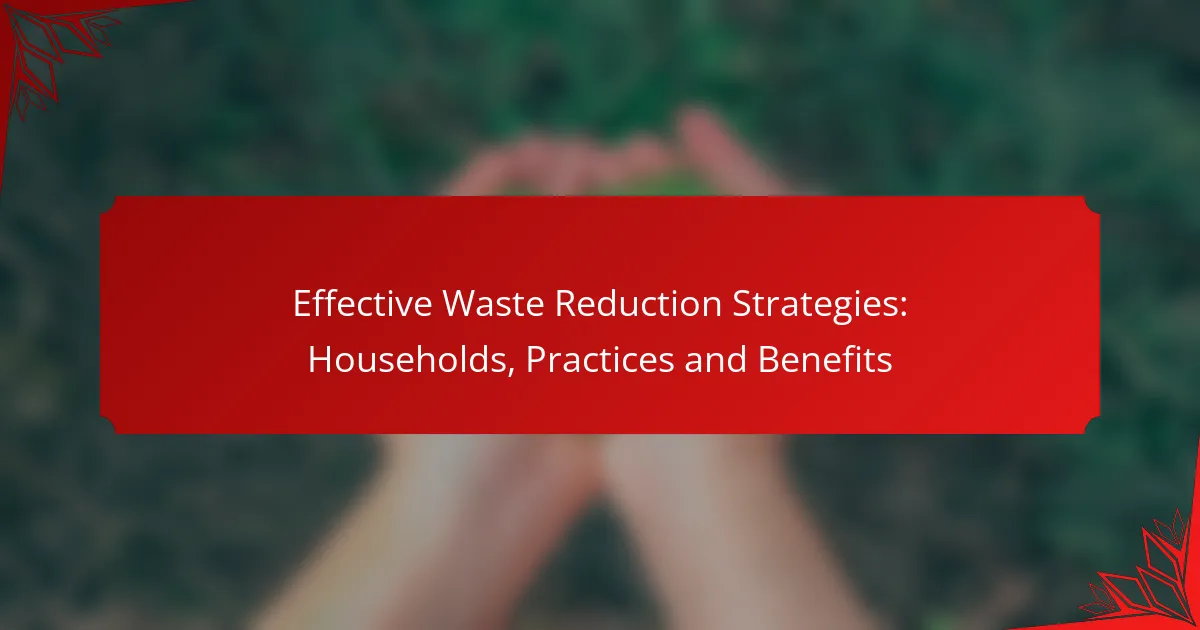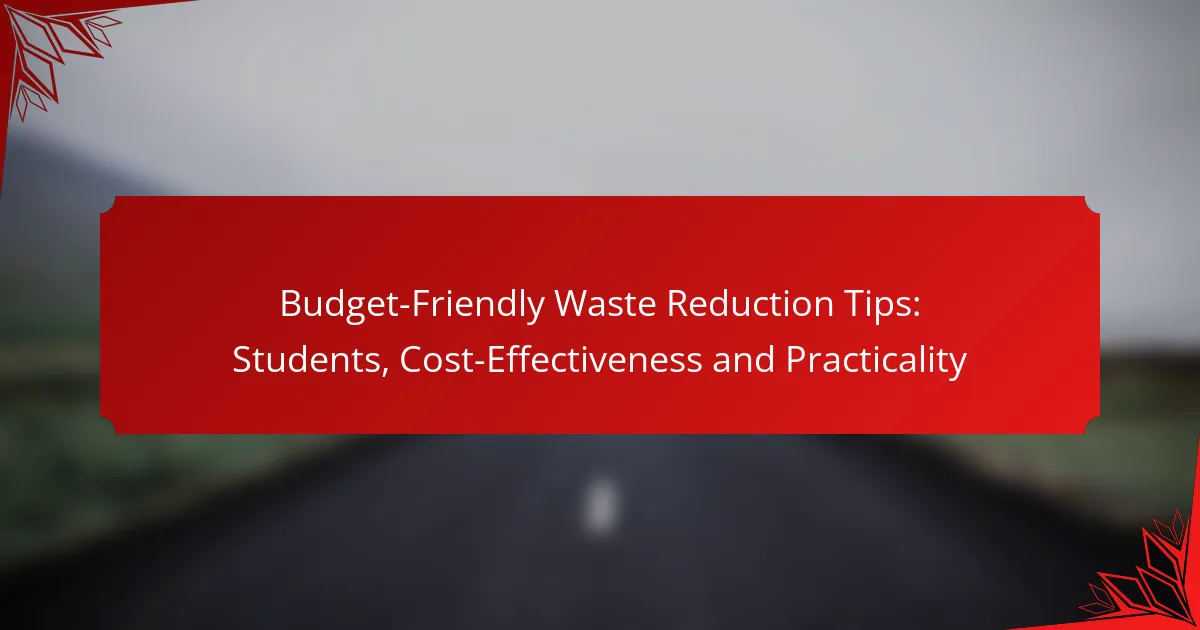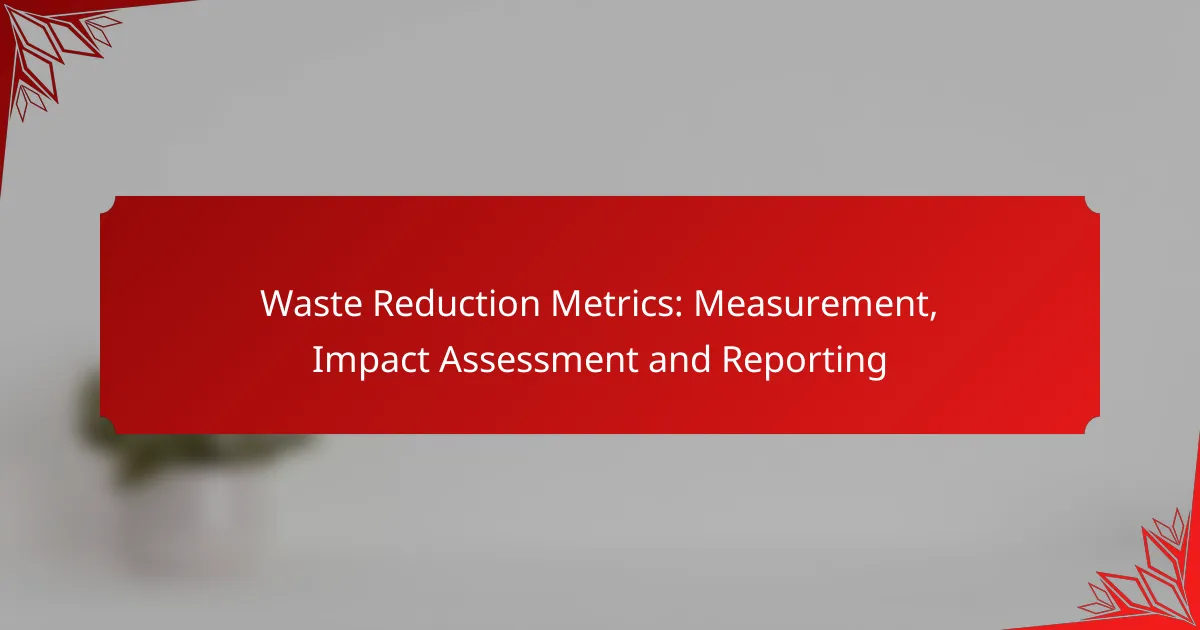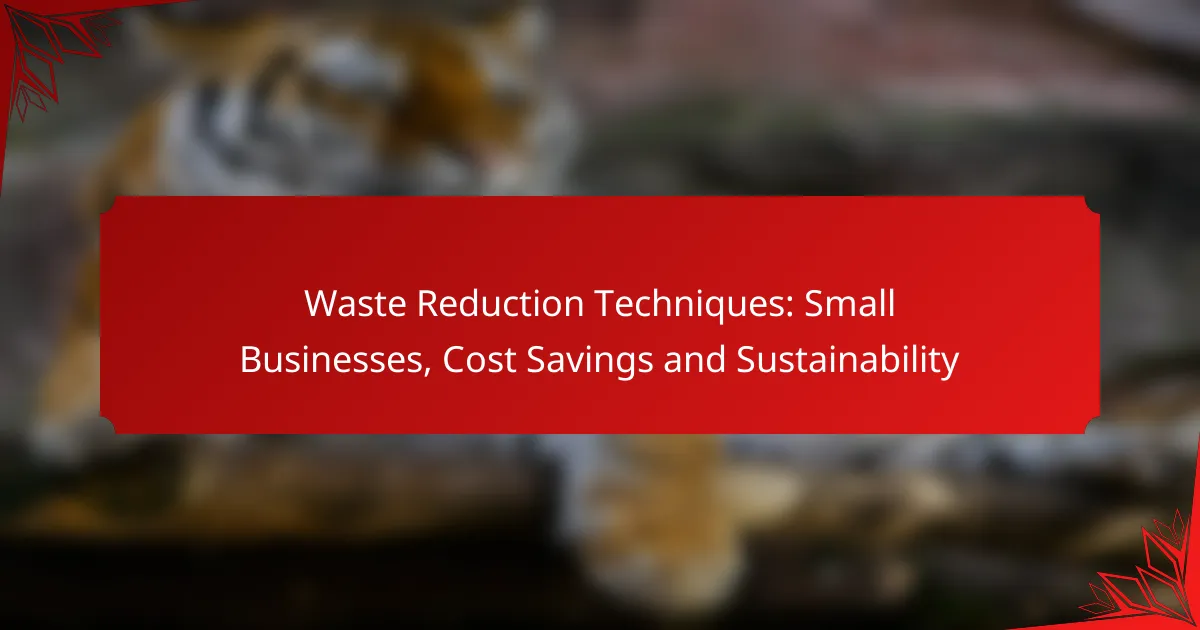Effective waste reduction strategies for households are essential for minimizing waste generation and fostering sustainable practices. By adopting mindful consumption habits and implementing simple changes, families can significantly lower their environmental impact while enjoying cost savings and improved community health.
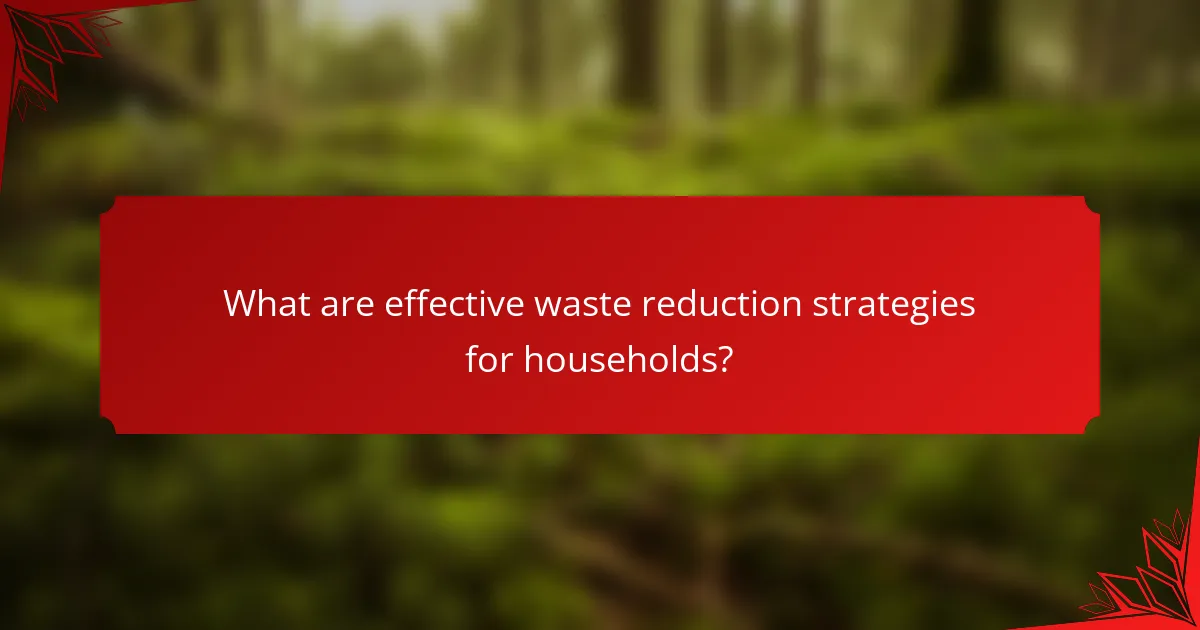
What are effective waste reduction strategies for households?
Effective waste reduction strategies for households focus on minimizing waste generation and promoting sustainable practices. By adopting these strategies, families can significantly decrease their environmental impact while often saving money.
Composting organic waste
Composting organic waste involves collecting kitchen scraps and yard waste to create nutrient-rich compost. This process reduces landfill waste and provides a natural fertilizer for gardens. Households can set up a compost bin or pile in their backyard or use a countertop composting system for smaller spaces.
To start composting, include materials like fruit and vegetable scraps, coffee grounds, and grass clippings while avoiding meat, dairy, and oily foods. Regularly turning the compost helps aerate it, speeding up decomposition.
Reducing single-use plastics
Reducing single-use plastics means minimizing items like plastic bags, straws, and utensils that are used once and discarded. Households can replace these with reusable alternatives, such as cloth bags, metal straws, and bamboo cutlery. This shift not only cuts down on waste but also encourages a more sustainable lifestyle.
To effectively reduce single-use plastics, consider keeping reusable items handy, such as in your car or bag. Additionally, choose products with minimal packaging when shopping, and support businesses that prioritize eco-friendly practices.
Implementing recycling programs
Implementing recycling programs involves sorting waste into recyclable and non-recyclable categories. Households can participate in local recycling initiatives, which often provide bins for paper, plastics, and metals. Understanding local regulations on recycling can enhance participation and ensure proper disposal.
To maximize recycling efforts, rinse containers before placing them in recycling bins, and check local guidelines for accepted materials. Many communities offer curbside pickup, making it easier to recycle regularly.
Buying in bulk
Buying in bulk reduces packaging waste and often saves money. Purchasing items like grains, nuts, and cleaning supplies in larger quantities can minimize the number of containers used. Many grocery stores offer bulk sections where customers can fill their own reusable bags or containers.
When buying in bulk, consider sharing purchases with friends or family to avoid excess. Always check the unit price to ensure you are getting a good deal and choose items with a longer shelf life to prevent spoilage.
Using reusable products
Using reusable products is a straightforward way to cut down on waste. Items like water bottles, coffee cups, and shopping bags can be used repeatedly, significantly reducing the need for disposable alternatives. This practice not only benefits the environment but can also lead to cost savings over time.
To incorporate reusable products into daily life, keep them accessible. For example, carry a reusable water bottle and coffee cup when leaving home. Look for durable options that fit your lifestyle, ensuring they are easy to clean and maintain.
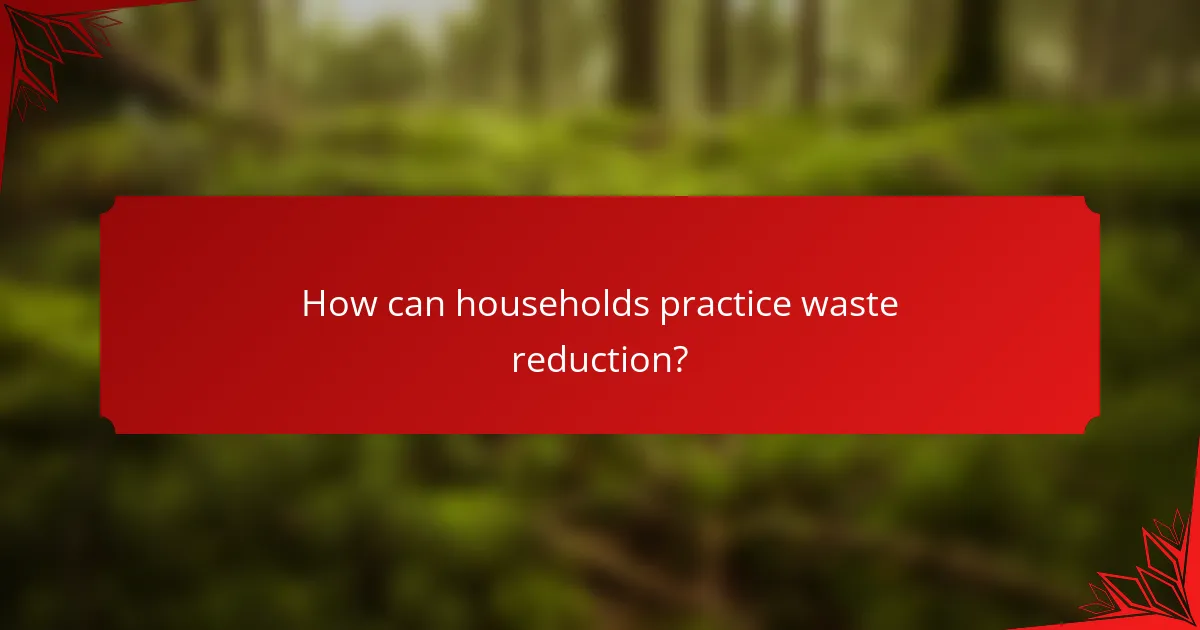
How can households practice waste reduction?
Households can practice waste reduction by implementing simple strategies that minimize waste generation and promote recycling. By being mindful of consumption habits and making small changes, families can significantly decrease the amount of waste they produce.
Conducting waste audits
Conducting a waste audit involves analyzing the types and amounts of waste generated by a household over a specific period. This process helps identify key areas for improvement and highlights items that can be reduced, reused, or recycled.
To perform a waste audit, collect all waste for a week and categorize it into groups such as food scraps, plastics, paper, and metals. This will provide a clear picture of waste patterns and inform future reduction efforts.
Setting up a waste reduction plan
A waste reduction plan outlines specific goals and strategies for minimizing waste. Start by setting achievable targets, such as reducing food waste by a certain percentage or eliminating single-use plastics.
Consider implementing practices like meal planning to avoid overbuying groceries, using reusable bags, and composting organic waste. Regularly review and adjust the plan based on progress and changing needs.
Educating family members
Educating family members about waste reduction is crucial for fostering a culture of sustainability at home. Discuss the importance of reducing waste and share practical tips that everyone can follow.
Engage family members in activities like recycling and composting, and encourage them to share their ideas for reducing waste. This collective effort can lead to more effective waste management and a greater commitment to sustainable practices.
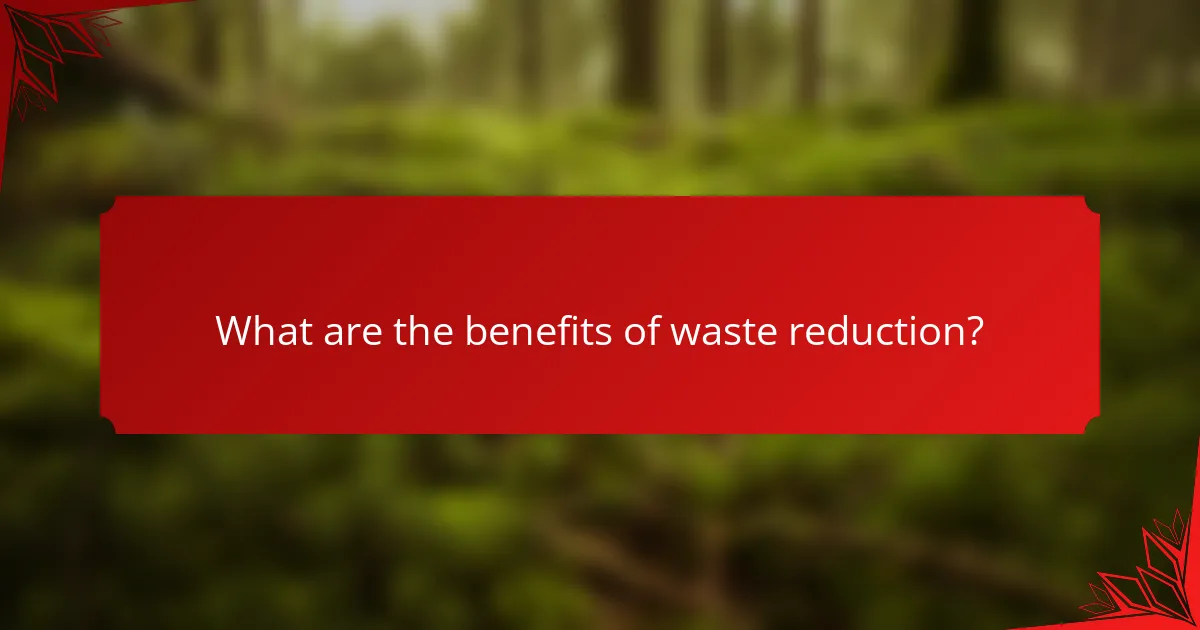
What are the benefits of waste reduction?
Waste reduction offers numerous advantages, including cost savings, environmental protection, and enhanced community health. By minimizing waste, households can contribute to a more sustainable future while also improving their own quality of life.
Cost savings on waste disposal
Reducing waste directly translates to lower expenses associated with waste disposal. Households can save money on garbage collection fees, which can range from a few dollars to over a hundred dollars monthly, depending on local regulations and service providers.
Additionally, by practicing waste reduction techniques such as composting and recycling, households can minimize the volume of waste sent to landfills, further decreasing disposal costs. Simple actions like buying in bulk or choosing products with less packaging can also lead to significant savings over time.
Environmental impact reduction
Waste reduction plays a crucial role in minimizing environmental harm. By decreasing the amount of waste generated, households can reduce the strain on landfills and lower greenhouse gas emissions associated with waste decomposition.
Moreover, less waste means fewer resources are needed for production, which can lead to a decrease in energy consumption and pollution. For instance, recycling materials like paper and plastic can save energy and reduce the need for new raw materials, contributing to a healthier planet.
Improved community health
Effective waste reduction contributes to better community health by reducing pollution and promoting cleaner living environments. Less waste in landfills can lead to fewer pests and decreased risk of disease transmission, benefiting public health.
Communities that embrace waste reduction often see an increase in green spaces and improved air quality. Initiatives such as community clean-up events and educational programs can foster a culture of sustainability, encouraging residents to adopt healthier practices and lifestyles.
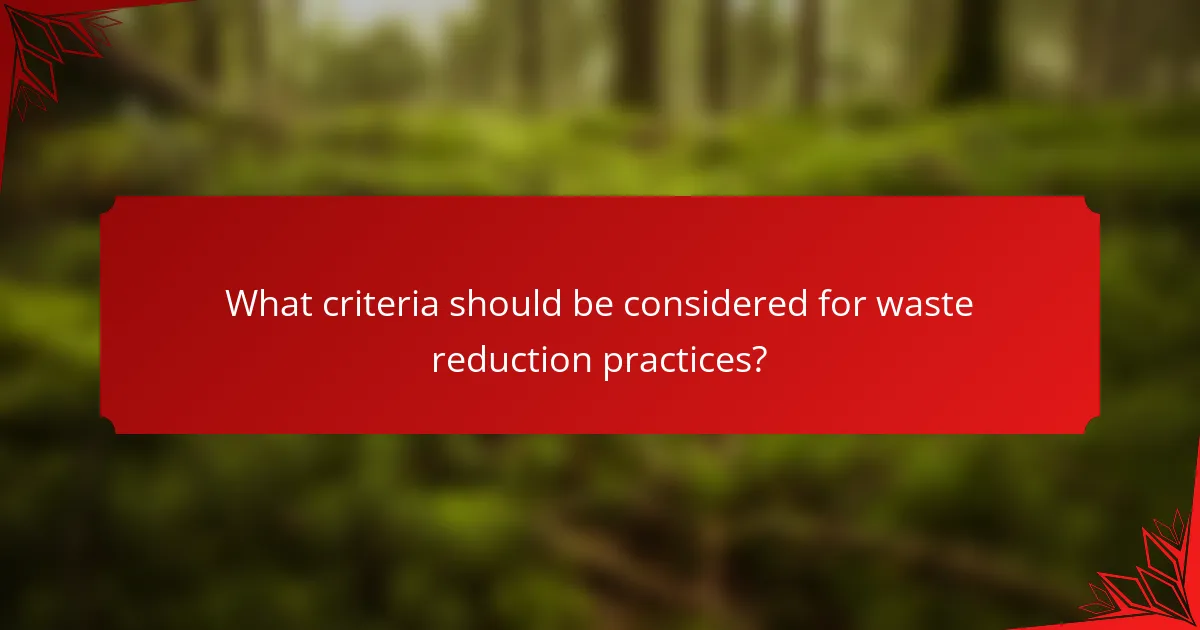
What criteria should be considered for waste reduction practices?
Effective waste reduction practices should consider local regulations, available community resources, and the specific needs of households. These criteria help ensure that strategies are not only compliant but also practical and supported by local initiatives.
Local regulations and guidelines
Understanding local regulations is crucial for implementing waste reduction practices. Many municipalities have specific laws regarding recycling, composting, and waste disposal that can guide households in their efforts. For instance, some areas may mandate recycling certain materials or provide incentives for reducing waste.
Check with local waste management authorities to learn about any guidelines or programs available in your area. Familiarizing yourself with these regulations can help avoid fines and ensure compliance while maximizing waste reduction efforts.
Community resources and support
Community resources play a vital role in supporting waste reduction initiatives. Local organizations often provide educational materials, workshops, and events focused on sustainable practices. Engaging with these resources can offer practical tips and foster a sense of community around waste reduction.
Additionally, consider joining local groups or online forums dedicated to sustainability. These platforms can connect you with others who share similar goals, allowing for the exchange of ideas and experiences, which can enhance your waste reduction strategies.
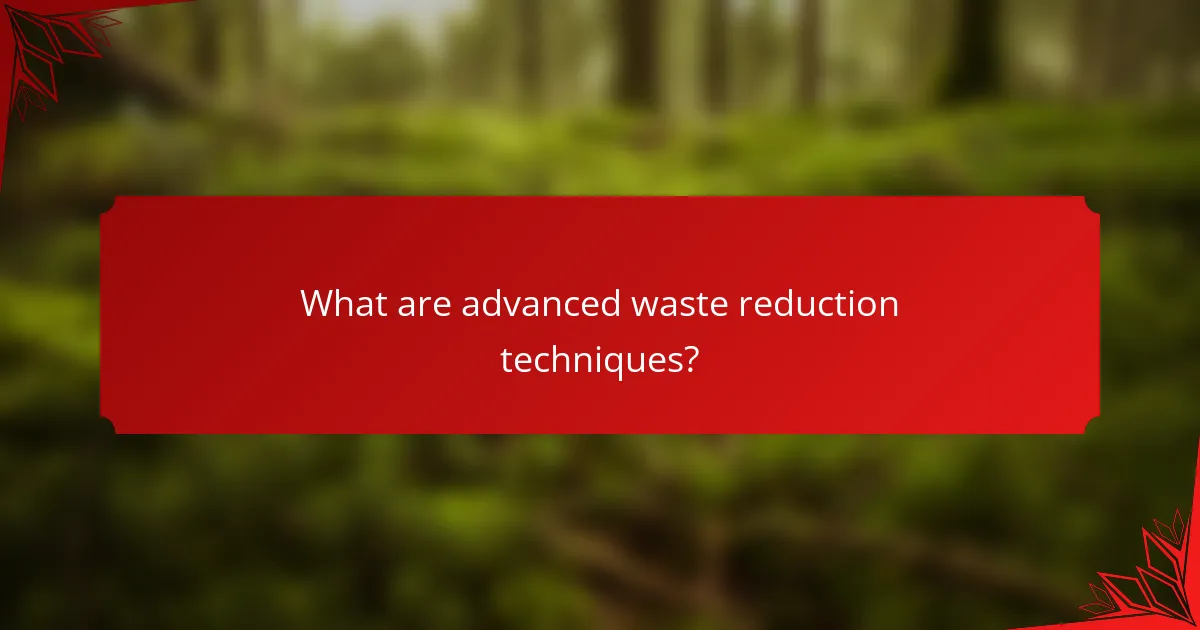
What are advanced waste reduction techniques?
Advanced waste reduction techniques focus on minimizing waste generation through innovative practices and lifestyle changes. These strategies aim to reduce the volume of waste sent to landfills while promoting sustainability and resource conservation.
Zero waste lifestyle adoption
Adopting a zero waste lifestyle involves making conscious choices to eliminate waste in daily activities. This includes using reusable products, composting organic materials, and avoiding single-use plastics. By prioritizing sustainability, households can significantly decrease their waste output.
Key steps to implement a zero waste lifestyle include assessing current waste habits, setting achievable goals, and gradually incorporating sustainable alternatives. For instance, replacing disposable bags with cloth totes and using glass containers for food storage can make a noticeable difference.
Upcycling and repurposing materials
Upcycling and repurposing materials transform waste into valuable items, extending the life of products and reducing landfill contributions. This practice encourages creativity and resourcefulness, allowing individuals to turn old furniture into new decor or use glass jars for storage.
To effectively upcycle, consider the potential of items before discarding them. Simple projects can include turning wooden pallets into garden furniture or using fabric scraps to create quilts. Engaging in local workshops or online tutorials can provide inspiration and practical skills for successful upcycling.
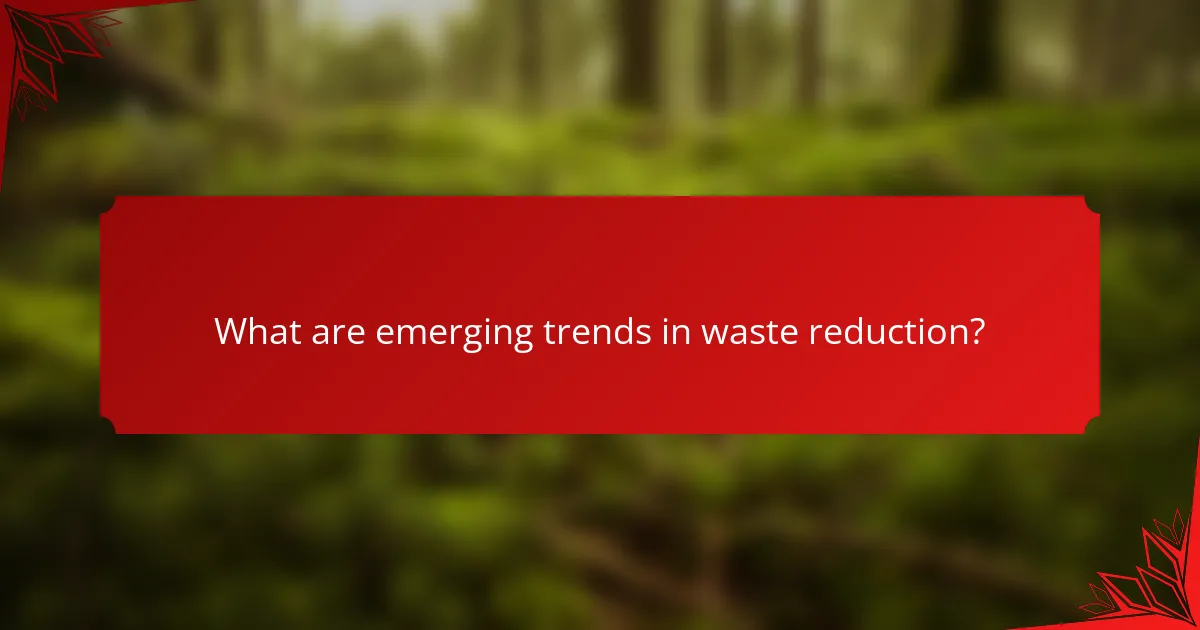
What are emerging trends in waste reduction?
Emerging trends in waste reduction focus on innovative practices that minimize waste generation at the source. These strategies include increased recycling efforts, the adoption of circular economy principles, and the use of technology to track and manage waste more effectively.
Zero Waste Lifestyle
The zero waste lifestyle aims to eliminate waste by redesigning resource life cycles. Individuals and communities adopt practices such as using reusable containers, composting organic waste, and purchasing in bulk to reduce packaging waste. This approach encourages mindfulness about consumption and promotes sustainable living.
Digital Waste Management Solutions
Digital waste management solutions leverage technology to optimize waste collection and recycling processes. Apps and platforms can help households track their waste output, identify recyclable materials, and connect with local recycling services. These tools can significantly enhance efficiency and reduce landfill contributions.
Community-Based Initiatives
Community-based initiatives play a crucial role in promoting waste reduction. Local programs often involve workshops, clean-up events, and educational campaigns that encourage residents to adopt sustainable practices. Collaborating with local businesses can also foster a culture of waste reduction, benefiting both the community and the environment.
Upcycling and Creative Reuse
Upcycling transforms waste materials into new products, extending their life cycle and reducing the need for new resources. Creative reuse projects can include turning glass jars into storage containers or repurposing old furniture. This trend not only minimizes waste but also inspires creativity and resourcefulness.
Policy and Regulation Changes
Policy and regulation changes are increasingly supporting waste reduction efforts. Governments are implementing stricter regulations on single-use plastics and incentivizing recycling programs. These policies aim to shift public behavior towards more sustainable practices and encourage businesses to adopt eco-friendly operations.
